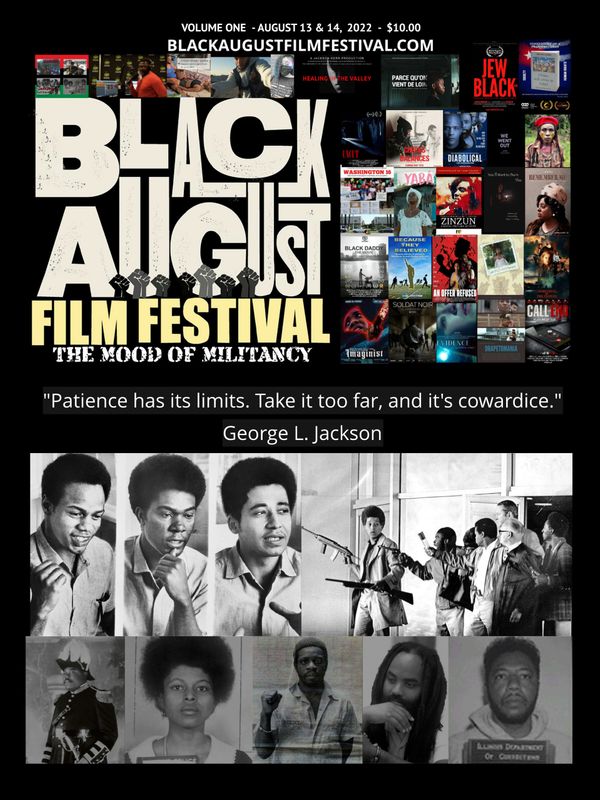
What is Black August and the FilmFest Named After It?
The inaugural Black August Film Festival, zooming in on what Frantz Fanon called “the wretched of the Earth” and their opposition to systemic racism, took place in Pasadena, California, August 13-14. Unlike other Black-themed filmfests that may screen socially conscious indies alongside the typical mindless entertainment of Hollywood studio features with African American talents, BAFF has a narrower, more politicized focus.
According to its website:
“The Black August Film Festival will welcome films from all over the world…about the social and economic issues of the oppressed. Black August is an invitation to reflect on the history of the Black freedom struggle, to celebrate those who have come and gone before us, and to commit to continuing this fight for justice and liberation until we win.” (See: https://blackaugustfilmfestival.com/)
BAFF is presented by the Pasadena African American Film Foundation (PAAFF), which teaches filmmaking to teens and supports local filmmakers. (See: https://paaffoundation.org/)
During a screening discussion, filmmaker James Farr, BAFF’s Co-Director, explained the meaning and origin of the name of the fete, which is redolent with “historical significance” in the struggle against “white domination,” which “culminated in the month of August. There is a thorough line of resistance.”
Farr, who appeared in and co-made some of the Festival’s documentaries, cited the example of the legendary Jonathan and George Jackson, of Soledad Brother fame (or notoriety, depending on your politics). Both carried out their radical acts of defiance and perished in the month of August.

BAFF’s website goes on to say: “The month of August is also rich with the history of Black resistance outside, from the Haitian Revolution [which began August 22, 1791] to the Watts rebellion [the civil unrest in Los Angeles took place August 11-16, 1965] and the Ferguson uprising [which began August 10, 2014, the day after Michael Brown’s fatal shooting in Missouri]. Black August is a reminder of the power in unity, and a mandate to continue the joint struggle.” In addition, America’s bloodiest slave revolt, led by Nat Turner, began on August 21, 1831, in Virginia. The iconic March on Washington for Jobs and Freedom, led by Dr. Martin Luther King, Jr., occurred on August 28, 1963, in the nation’s capital.
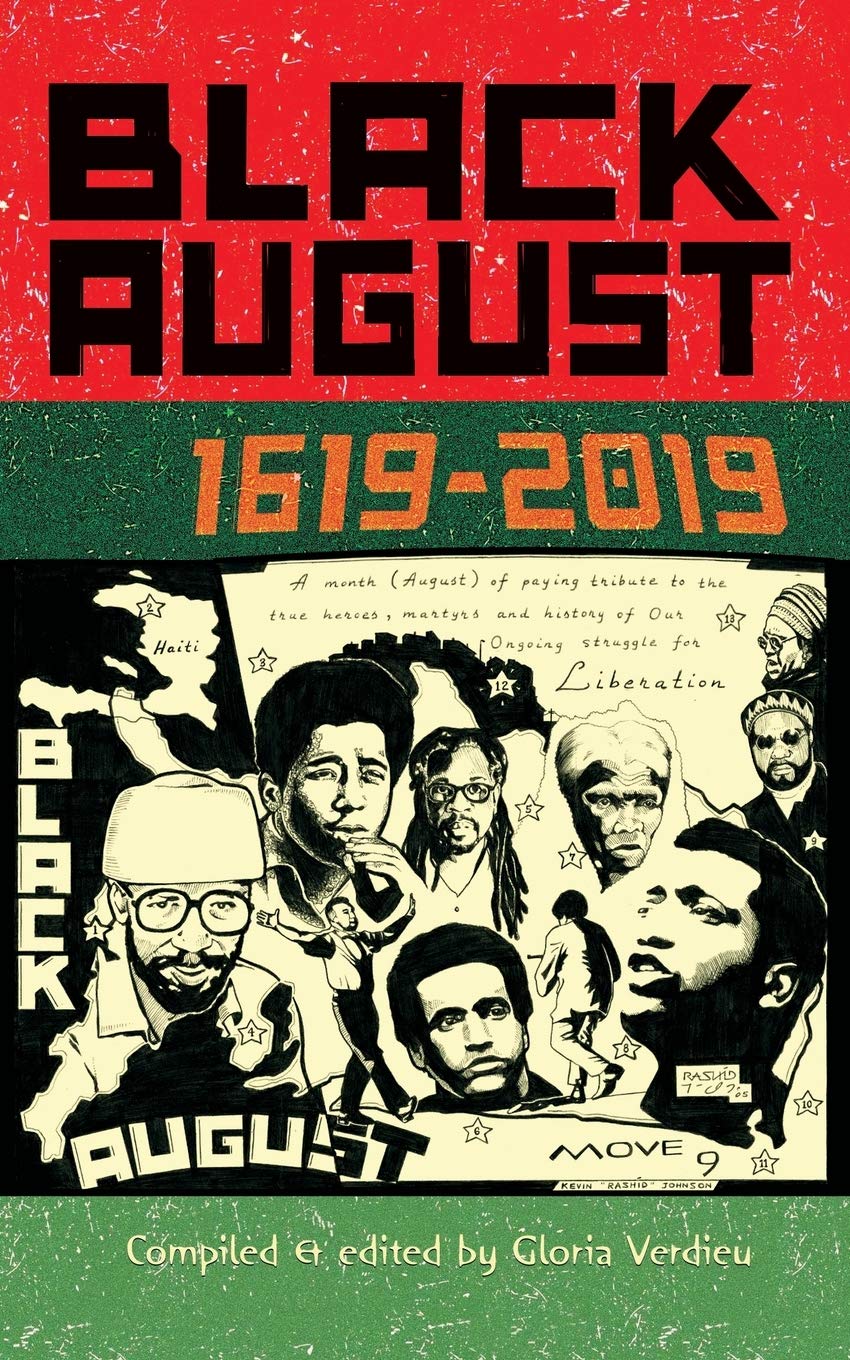
Farr pointed out that the city where BAFF was held also played a noteworthy role in the Black freedom struggle. He noted that Jonathan Jackson was raised in Pasadena, and it is where Michael Zinzun, the subject of one of the documentaries screened at the Festival, also lived. I would add that the man who broke major league baseball’s color barrier, Jackie Robinson, was also from Pasadena. (For what it’s worth, the fictional Caucasian protagonist of the 1967 youth culture hit The Graduate starring Dustin Hoffman was from Pasadena, too.)
BAFF screened a total of 20-plus productions, including fiction and nonfiction, shorts, feature-length movies, animation, multi-media and more works. Most of the screenings took place in two of the theatrical spaces at Boston Court, a well-appointed performing arts center in Pasadena, where I previously reviewed live stage productions (see: https://hollywoodprogressive.com/stage/beckett-happy-days). Trailers of BAFF’s various films can be seen at: https://blackaugustfilmfestival.com/trailers-1.
Here are reviews of some of them:
The Zen of Zinzun
The biopic Zinzun: A Revolutionary Activist, directed by PAAFF Executive Director Dennis Haywood and co-produced by Farr, is about Pasadena’s noted campaigner Michael Zinzun. This 52-minute nonfiction film is a PAAFF project that also encapsulates the stirring saga of Jonathan and George Jackson.
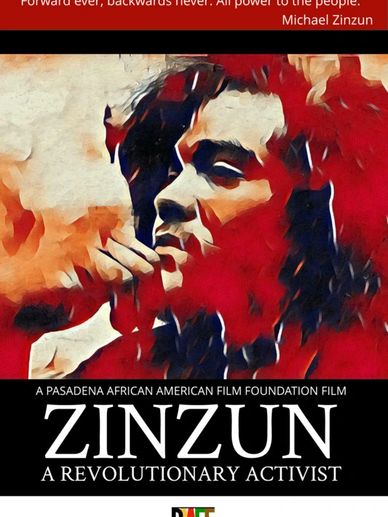
In a desperate attempt to liberate his older sibling and the other “Soledad Brothers,” apparently acting in league with Black Panther defendants, 17-year-old Jonathan staged a daring attack on the Marin County Courthouse, seizing a judge, Deputy District Attorney and jurors on August 7, 1970.

The hostage-taking ended in a bloodbath and as guns Jonathan used were registered to Angela Davis, the activist/academic went underground as she was subjected to one of the most intensive manhunts in FBI history. (Davis was eventually acquitted.) On August 21, 1971, George Jackson—who was a Field Marshal of the Black Panther Party—was shot dead during a bold escape attempt at San Quentin prison.
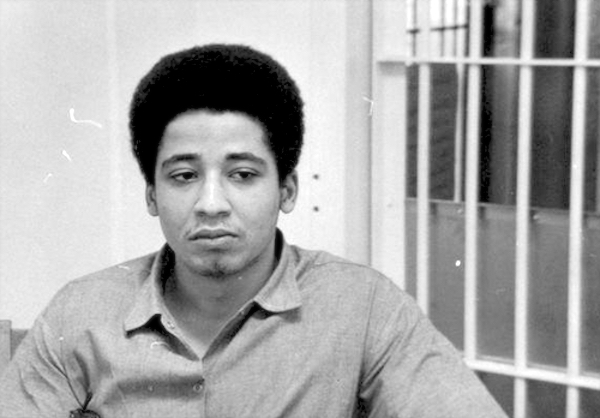
According to Zinzun: A Revolutionary Activist, it was against this crucible of radical violence that 21-year-old Michael Zinzun joined the Black Panthers in the early 1970s. However, critical of the BPP’s cult of personality, the Pasadena resident left the militant organization after two years. Undaunted, Zinzun pursued activism, co-founding the Coalition Against Police Abuse, and devoting much of his organizing against law enforcement’s excessive use of force, including advocating for a civilian review board to monitor police brutality. In the process, Zinzun lost an eye in an altercation with Pasadena police, which explains why he was often seen wearing an eyepatch.
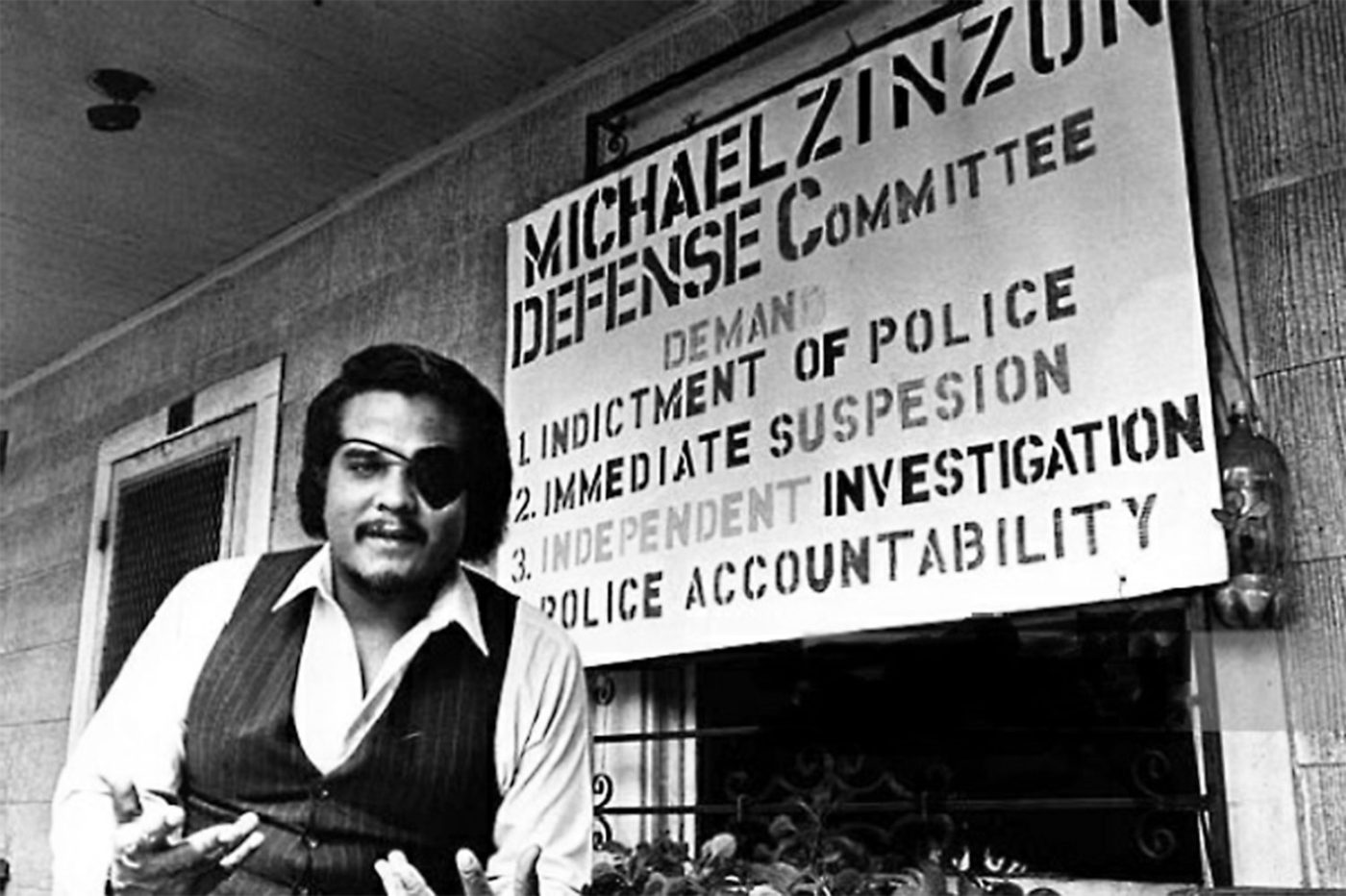
Zinzun went on to become a media figure, presenting the cable access TV program Message to the Grass Roots. He also ran for office, seeking to be elected to the state assembly on the Peace and Freedom Party ticket and sought a seat on the Pasadena City Council. But his unsuccessful campaign was dogged by allegations from the LAPD and others that Zinzun was the subject of investigation by LAPD’s anti-terrorism division. Zinzun went on to sue for defamation and eventually won a half million dollar-plus award.
An internationalist, Zinzun also traveled to Brazil and Namibia, where he supported the South West Africa People’s Organization (SWAPO), which had a guerrilla wing, in its independence struggle against South Africa’s apartheid regime. I learned a lot from Zinzun: A Revolutionary Activist, which is a highly educational documentary about an important leader.
Check It Out
Not all of Black August Film Festival’s productions were nonfiction, and my favorite movie at the fest was writer/director Frederick Hawthorne’s Checks X Balances. With its tantalizing premise, this is one of those shorts that begs to have the budget to turn it into a feature-length motion picture. Although part of this short has the veneer of a news-type program, with actuality clips of Malcolm X and other actual historic personages and Kathleen Bradley portraying a fictional TV talk show host named Serena Knowles, Checks X Balances is actually a scripted, narrative production with actors playing roles.
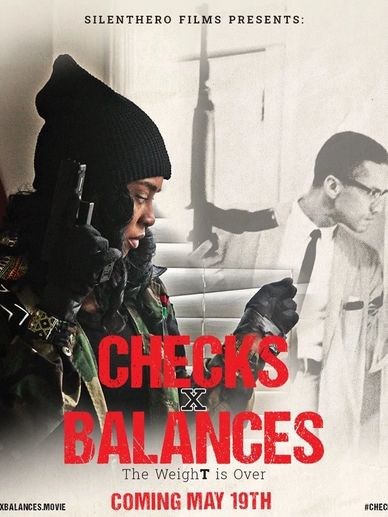
On-screen, Serena “interviews” an attractive, distinguished married couple, Xavier and Ebony Jones (Jerome Ro Brooks and Jasmine Hester), who are introduced as experts on Malcolm X. But the Joneses are more than mere academics or authors—the Joneses are vigilantes who secretly have a deisre to attain justice for aggrieved African Americans—by whatever means necessary. They are enraged that, as a line of dialogue puts it: “Time after time we see killers go free.”
With Xavier wearing a sweatshirt emblazoned with the word “Reparations,” the trigger-happy Joneses embark on a killing spree of reprisals against figures such as George Zimmerman, who shot teenager Trayvon Martin in 2012 in Florida, and one of the police officers who raided Breonna Taylor’s Louisville, Kentucky, home with a no-knock warrant, resulting in the 26-year-old’s untimely death in 2020. (Hawthorne’s 2022 movie was shot before officers involved in the raid were charged by the Justice Department in August 2022 with falsifying a search warrant and more.)
The militant couple also confront the old white woman who, in her youth, had claimed Emmett Till harassed her, denouncing Carolyn Bryant as “the first Karen.” Checks X Balances was presumably made before June 2022, when an unserved arrest warrant for Bryant was discovered and the district attorney and a grand jury declined to press charges against the woman whose false claim is believed to have caused 14-year-old Till’s 1955 torture and death, which was a clarion call triggering the Civil Rights movement. But the failure of law enforcement to hold Bryant accountable lends credence to the Joneses’ contention that retribution must be served vigilante-style by revolutionaries in racist America.
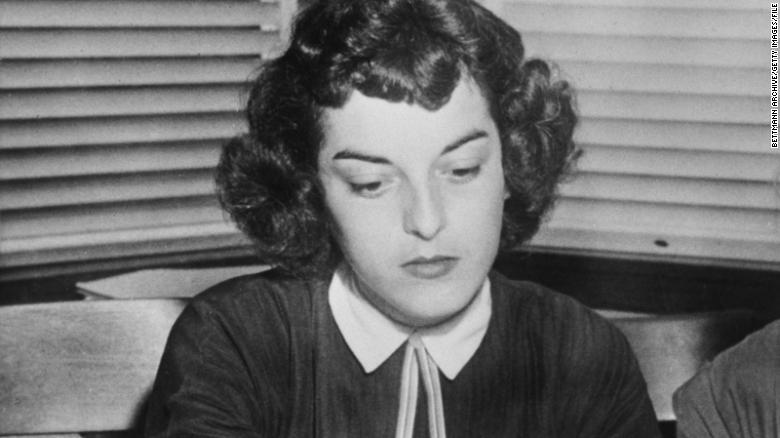
Hawthorne’s gripping short ends with Sam Cooke singing the Civil Rights anthem “A Change is Gonna Come.” The cheeky Checks X Balances is in the tradition of Melvin Van Peebles’ early 1970s trendsetters Watermelon Man and Sweet Sweetback’s Baadasssss Song, and is provocative independent filmmaking that I believe epitomized BAFF’s purpose. More than any other single film it lived up to the Festival’s subtitle: “The Mood of Militancy.”
Checks X Balances boldly poses the proposition that, to attain justice in racist America, radicals must take the law into their own hands and pursue direct action, by any means necessary. As right-wing violence dominates the news, Hawthorne contemplates an ultra-left version of vengeance and reckoning. Bravo to Hawthorne, who cut his cinematic teeth as an intern on Spike Lee’s 1992 Malcolm X.
Final Cut
Another thought-provoking short is Michael Hensley’s Uncut, a meditation on the coming of fascism to America, when the so-called New Republic Patriot Party comes to power and, like latter-day versions of the SS doctor Josef Mengele—the Nazi “Angel of Death” who practiced inhumane “scientific” experiments on prisoners at Auschwitz—impose forced sterilization on all males 35 and older in order to reduce the number of child defects and the like as part of the conservatives’ quest for racial superiority.
The film cleverly spins the dynamic currently playing out in a variety of so-called “red” states, where MAGA-dominated governments are denying females basic reproductive rights. But unlike abortion, Uncut shrewdly places the onus on the male of the species in this topsy-turvy Handmaid’s Tale, in this role reversal of gender politics (although the New Republic Patriot Party is patriarchal and male-dominated). In addition, the cast is mostly if not all Caucasian, dramatizing how rank-and-file whites, too, are imperiled by incipient totalitarianism.
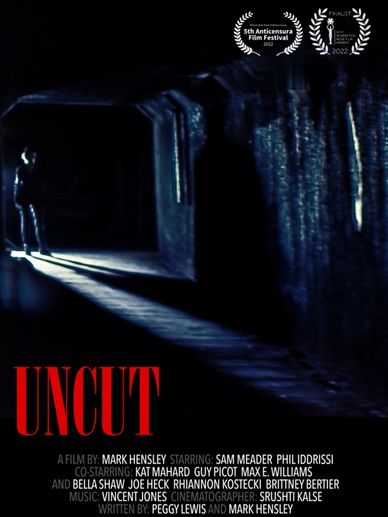
The film stresses the Reichian observation that, if the state dominates reproduction and sexuality, it “controls the person.” The short’s plot centers on Jamie, a “runner”—a male nearing his 35th birthday and thus the age for state-mandated obligatory vasectomy, who wants to flee across the border to Canada—and is clandestinely helped by a contemporary version of the Underground Railroad to escape to freedom and safety.
The runner’s main rescuer is an attorney named Lenny, whose grandparents had been shipped to concentration camps during WWII. Hensley shot the low-budget Uncut largely in close-up, and its taut, terrifying premise enhances a sense of apprehension and dread, despite the lack of sophisticated Hollywood studio production values. Hensley attended the BAFF screening saying that, after growing up in Europe, “returning to America was the biggest disappointment in my life.” Like Checks X Balances, Hensley’s Uncut is a short that demands a budget in order to become a full-length feature film.
Upended
A recurring theme throughout the Black August Filmfest is police excessive use of force, and in less than ten minutes writer/director Hakima Benjamin’s Call End chillingly dramatizes this hot-button topic. While walking home from school, an African American adolescent named Daniel (Kevin Womack) calls a friend, gushing about how he has just won a certificate of achievement and how he can’t wait to share it with his proud parents. However, for no apparent reason, he is being tailed by plainclothes police in an unmarked car who harass him. Increasingly terrified, Daniel calls his nearby father, imploring him to come to his rescue.
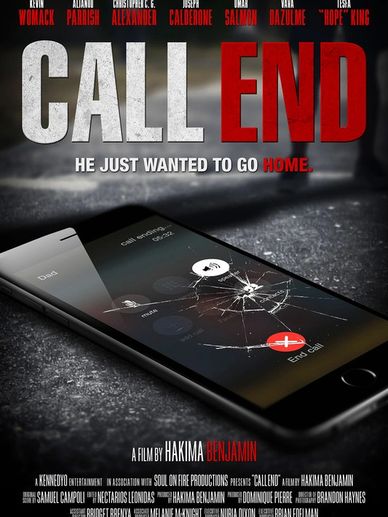
There is a plot twist, when the dad shows up in uniform—and there is an armed standoff between the uniformed father and the white officers in civvies in this tautly directed, well-acted film, which deservedly won a Best Short Film accolade from the New Jersey Film Awards.
The Rent is Too Damn High!
Washington 16 is a heartfelt documentary about tenants’ rights struggles in Pasadena, and is another PAAFF project. The film explores the challenges facing renters in Pasadena, including high rents; gentrification; the need for rent control; and uncaring landlords. At one point, activists descend upon the posh mansion of a moneybags landlord ensconced in one of Pasadena’s most upscale neighborhoods, where demonstrators shame the brazen capitalist in front of his neighbors. A woman activist asserts: “Poverty is a man-made condition because of greed.” The screening was followed by a panel discussion with tenant advocates discussing the grim reality of the struggle to keep a roof over one’s head.
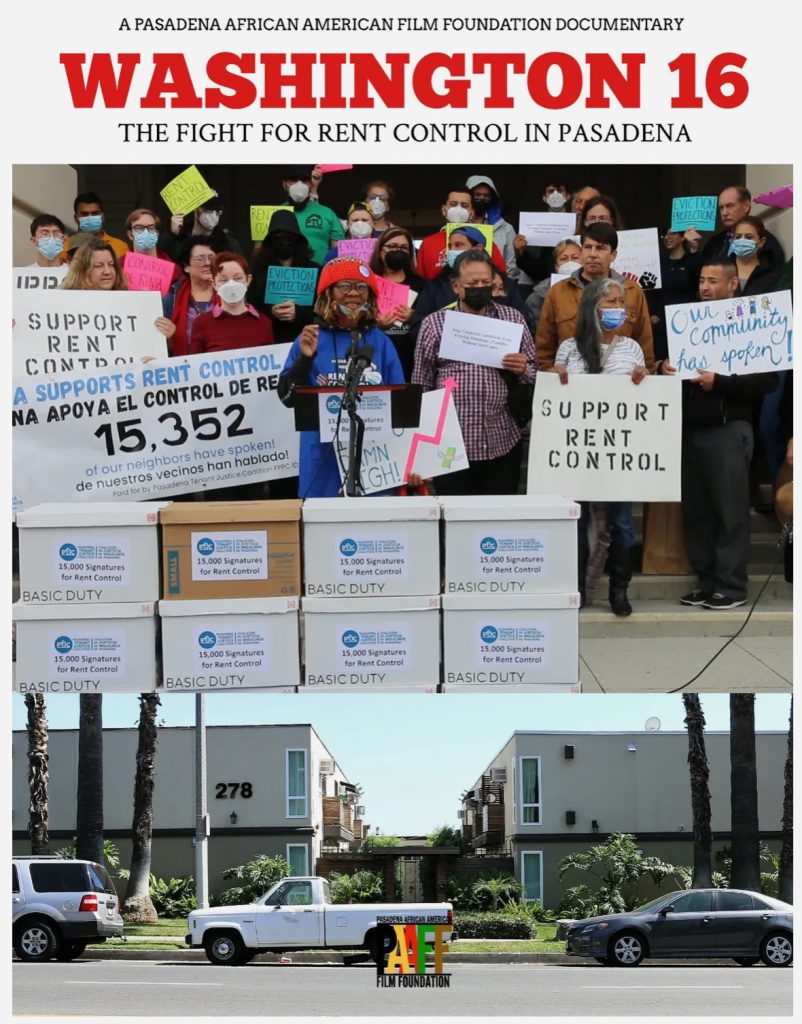
African American Fatherhood
In Black Daddy: The Movie, director Dame Drummer makes a moving argument against the perception that Black males are absentee fathers who don’t play direct roles in their children’s lives. Before the screening, Drummer told the audience he objected to how African American men are depicted by the mostly Caucasian-controlled MSM: “We always see athletes… [but] only 400 people can make a living playing basketball” in America. Instead, Drummer, who appears in his film, wants to show “the realistic side of Black men…The narrative has to be in our control—not white writers,” insisted Drummer, who is himself a father deeply invested in his children’s well-being. In the award-winning Black Daddy Drummer “followed the lives of a few like-minded men as they told compelling stories of the joy, pain and the complexity of what it means to be a Black father in America,” as BAFF’s website states. (For more info see: https://www.blackdaddythemovie.com/)
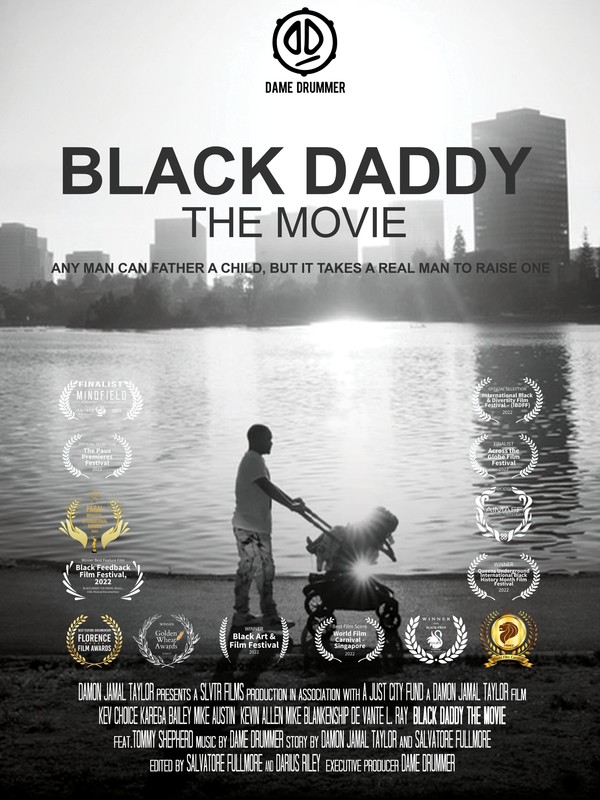
Foreign Films
BAFF also screened a number of works depicting the Black experience in the diaspora outside of the United States that are in various languages with English subtitles. Cédrick-Isham Calvados’s thoughtful, award-winning documentary Because We Come from Afar explores the identities of France’s Blacks from various places ruled by Paris, including Martinique, Guadeloupe and Reunion. Interviewees discuss their sense of “loneliness” and how “confusing” their situation is, with one foot in, and one foot forever outside of “hexagonal” or metropolitan France, with its European mainstream. The subjects discuss what form of government they want for their homelands vis-à-vis Paris, governance options which include autonomy and independence. The film is reflective but overly long and repetitive—it could have used some judicious editing, but is nevertheless worthwhile.

Keoni Wright’s nonfiction Romeo’s Road is set in Suriname, formerly Dutch Guiana, Amsterdam’s former colony in South America. The title character, Romeo Koffymaga, is descended from the Maroon people who fled slavery and preferred to live in remote natural areas, rather than be enslaved.
Romeo is currently an anti-logging activist, but during Suriname’s Civil War, he was trained to be a guerrilla and fought from 1986 to 1992. Interestingly, Romeo claims that Libyans helped train the commandos, which (if true?) is something I never heard before. (See: https://keoniwright.com/)
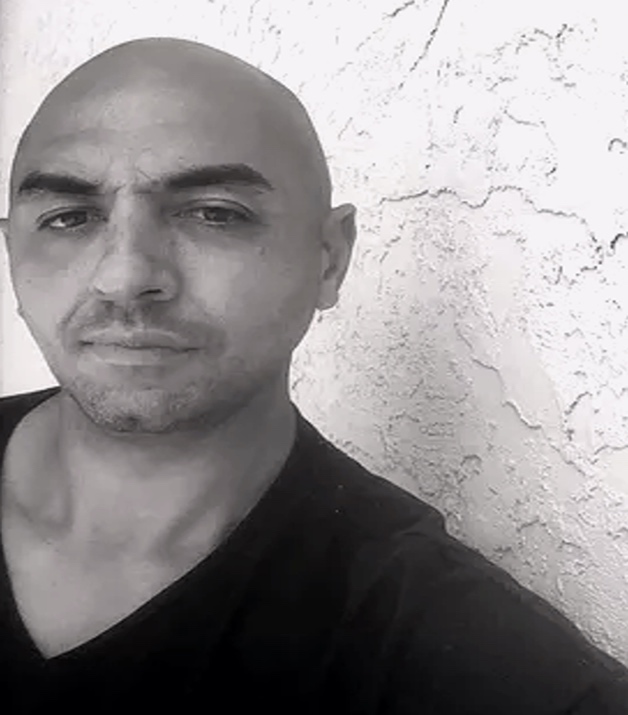
Co-writer/director Jimmy Laporal Trésor’s Black Soldier may sound like another military-themed short, but in fact it is an absorbing narrative scripted work featuring actors that explores racism against Blacks in contemporary France where, the film laments, “Your country has never evolved a place for you to belong.” Jonathan Feltre portrays the teenaged title character, aka Hughes, a pugilist who reads Maupassant. In almost half an hour, Trésor’s treasure touches upon boxing, alienation, father-son tumult, high school, gangs, skinheads and more. Trésor is a 45-year-old Black filmmaker born in Paris, and the auteur’s Black Soldier has a Richard Wright-like vibe. And the short’s line of dialogue “I’m not their N[-word]” likewise conjures up thoughts of another “Jimmy” – James Baldwin.
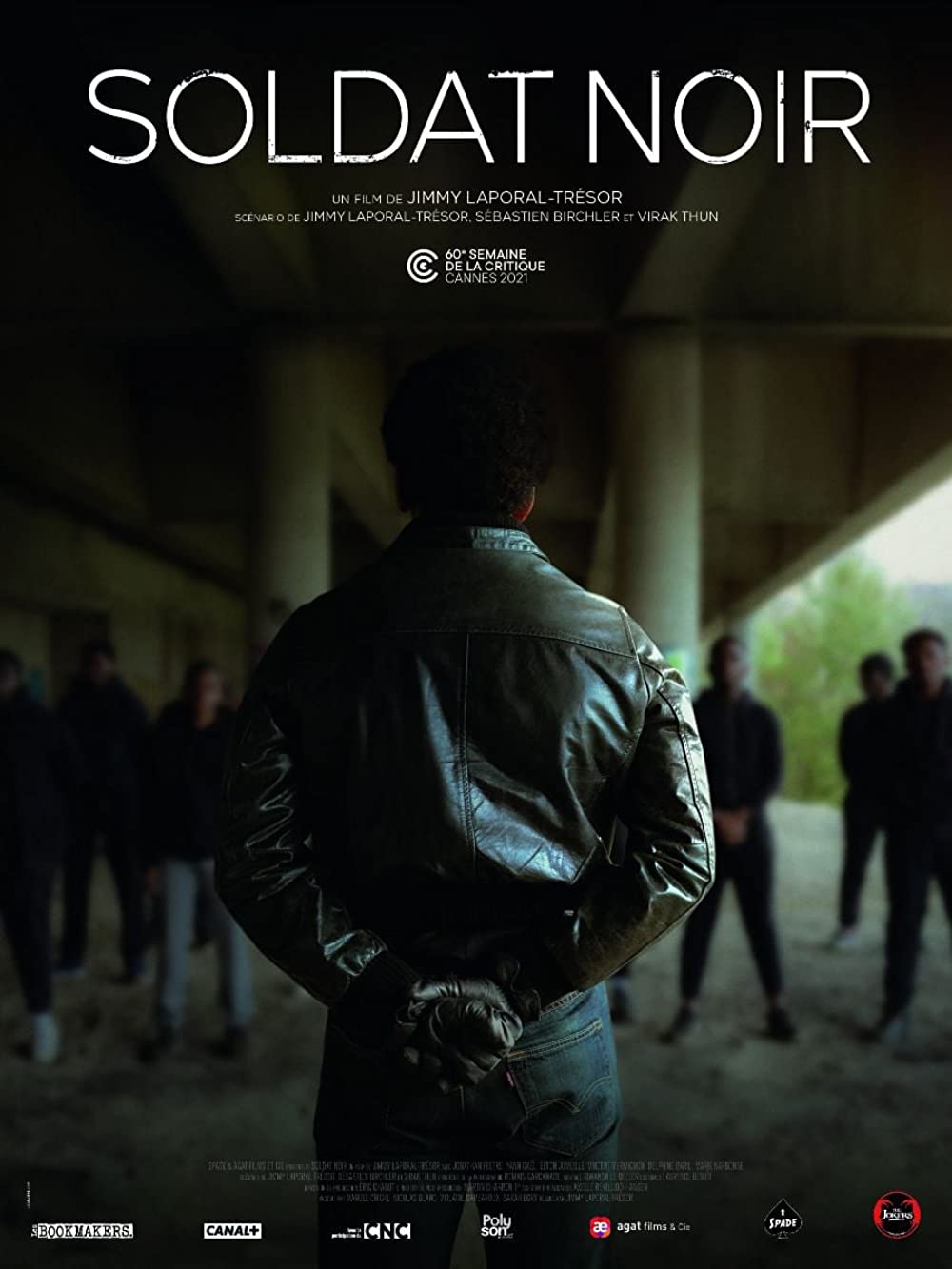
On August 14 BAFF screened a double feature at Friendship Pasadena Church: Maya Brown’s I Am My Sister’s Keeper and director Denise Dowse’s feature film Remember Me: The Mahalia Jackson Story (see: https://www.youtube.com/watch?v=ckW-ybifStk), with Grammy-winner Ledisi portraying the Gospel singer who she also depicted in Ava DuVernay’s 2014 Civil Rights epic Selma and was a close friend of Dr. King (portrayed here by Columbus Short).
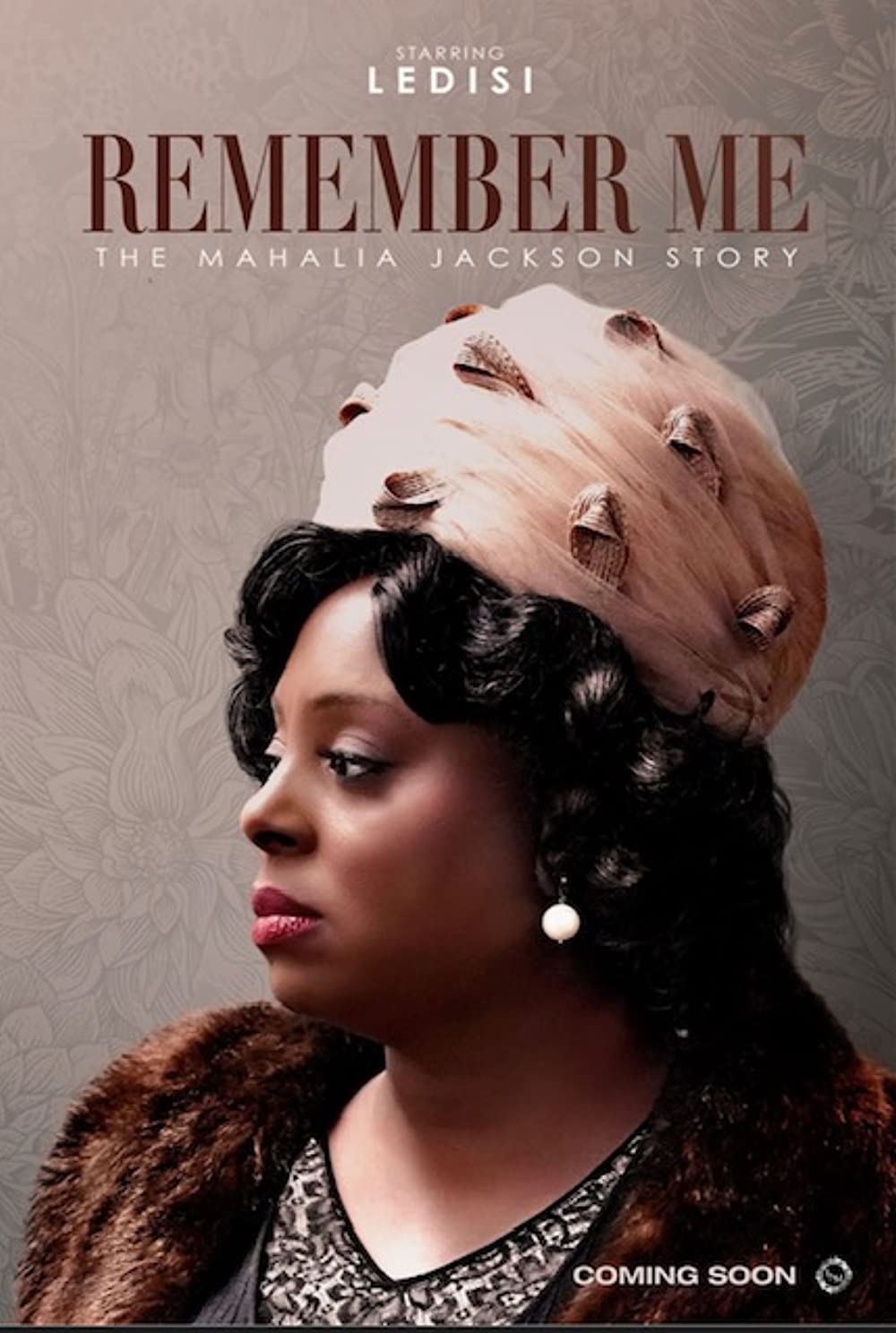
BAFF’s website quotes the filmfest’s co-founders as feeling: “After experiencing the racial divide at film festivals they had entered, they decided to create a space for cultural films from around the world.” With their debut Festival highlighting not just Black-themed but Black liberation-themed films, they have succeeded in doing so.
During the fete co-director James Farr declared that BAFF was intended to be a “legacy” cultural event. Judging by this premiere presentation, lovers of films of consciousness and conscience will hopefully have many more years of meaningful movies to look forward to at future Black August Film Festivals to come.

CovertAction Magazine is made possible by subscriptions, orders and donations from readers like you.
Blow the Whistle on U.S. Imperialism
Click the whistle and donate
When you donate to CovertAction Magazine, you are supporting investigative journalism. Your contributions go directly to supporting the development, production, editing, and dissemination of the Magazine.
CovertAction Magazine does not receive corporate or government sponsorship. Yet, we hold a steadfast commitment to providing compensation for writers, editorial and technical support. Your support helps facilitate this compensation as well as increase the caliber of this work.
Please make a donation by clicking on the donate logo above and enter the amount and your credit or debit card information.
CovertAction Institute, Inc. (CAI) is a 501(c)(3) non-profit organization and your gift is tax-deductible for federal income purposes. CAI’s tax-exempt ID number is 87-2461683.
We sincerely thank you for your support.
Disclaimer: The contents of this article are the sole responsibility of the author(s). CovertAction Institute, Inc. (CAI), including its Board of Directors (BD), Editorial Board (EB), Advisory Board (AB), staff, volunteers and its projects (including CovertAction Magazine) are not responsible for any inaccurate or incorrect statement in this article. This article also does not necessarily represent the views the BD, the EB, the AB, staff, volunteers, or any members of its projects.
Differing viewpoints: CAM publishes articles with differing viewpoints in an effort to nurture vibrant debate and thoughtful critical analysis. Feel free to comment on the articles in the comment section and/or send your letters to the Editors, which we will publish in the Letters column.
Copyrighted Material: This web site may contain copyrighted material the use of which has not always been specifically authorized by the copyright owner. As a not-for-profit charitable organization incorporated in the State of New York, we are making such material available in an effort to advance the understanding of humanity’s problems and hopefully to help find solutions for those problems. We believe this constitutes a ‘fair use’ of any such copyrighted material as provided for in section 107 of the US Copyright Law. You can read more about ‘fair use’ and US Copyright Law at the Legal Information Institute of Cornell Law School.
Republishing: CovertAction Magazine (CAM) grants permission to cross-post CAM articles on not-for-profit community internet sites as long as the source is acknowledged together with a hyperlink to the original CovertAction Magazine article. Also, kindly let us know at info@CovertActionMagazine.com. For publication of CAM articles in print or other forms including commercial internet sites, contact: info@CovertActionMagazine.com.
By using this site, you agree to these terms above.
About the Author
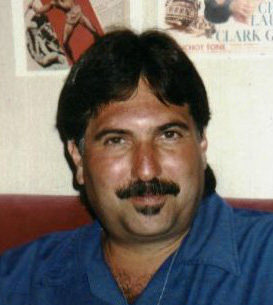
Ed Rampell is an L.A.-based film historian and critic who also reviews culture, foreign affairs and current events.
Ed can be reached at edrampel@gte.net.


[…] expo as “#OscarsSoWoke.” But along with the first Black August Film Festival at Pasadena (see: https://covertactionmagazine.com/2022/08/29/mood-of-militancy-movies-star-at-black-august-film-festi…), it does seem that we’re experiencing progress in terms of more accurate, authentic […]
I would like to alert anyone who cares to the collusion between the Chicago Children’s Hospital and the Chicago Board of Education to present trans and kink “education” to children in Chicago public schools. Since pushing children into transgenderism involves mutilating and sterilizing them — and because I would assume that many Chicago students are either black or Latino — this seems like more eugenics coming from our beloved [sic] government.